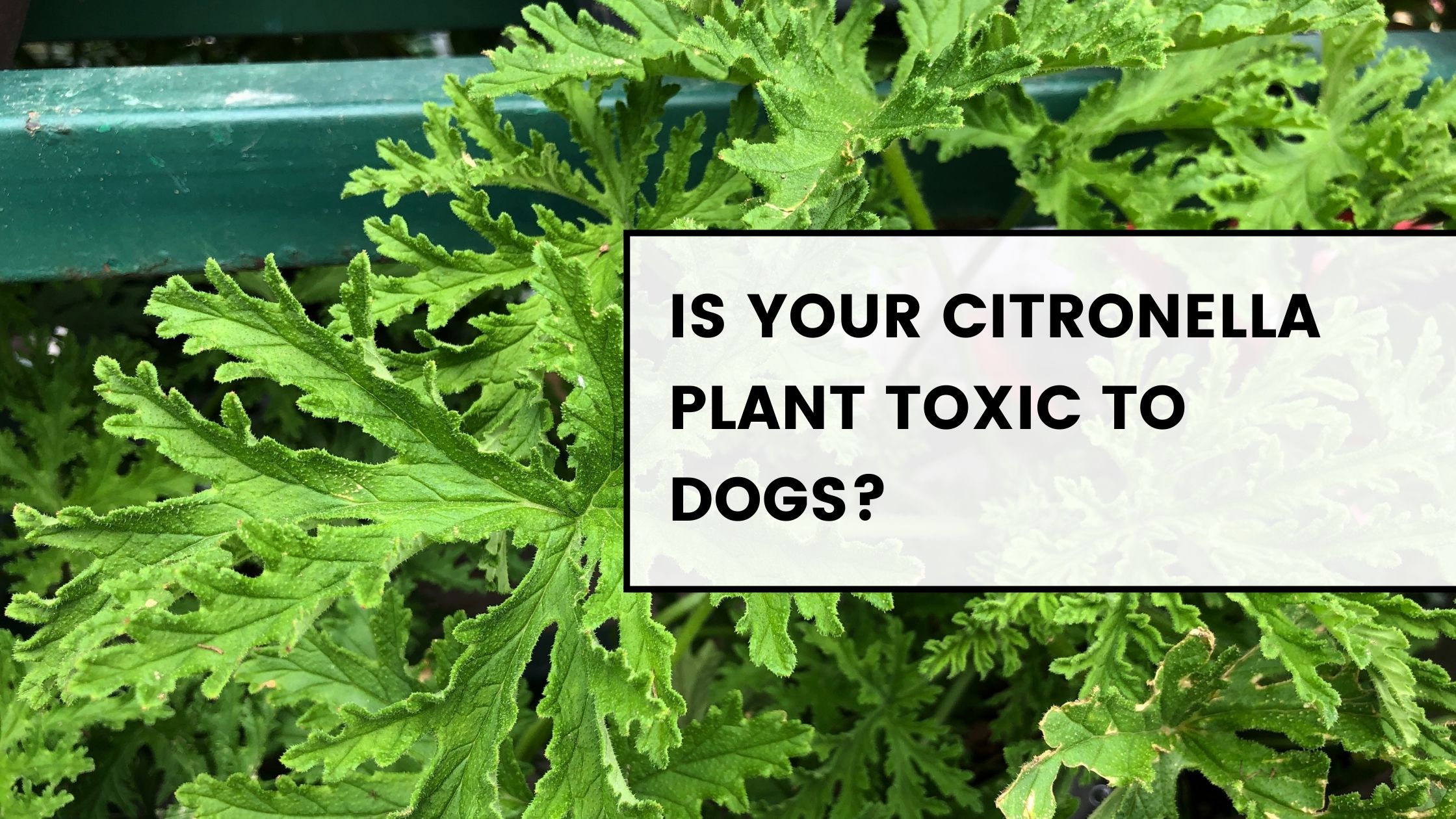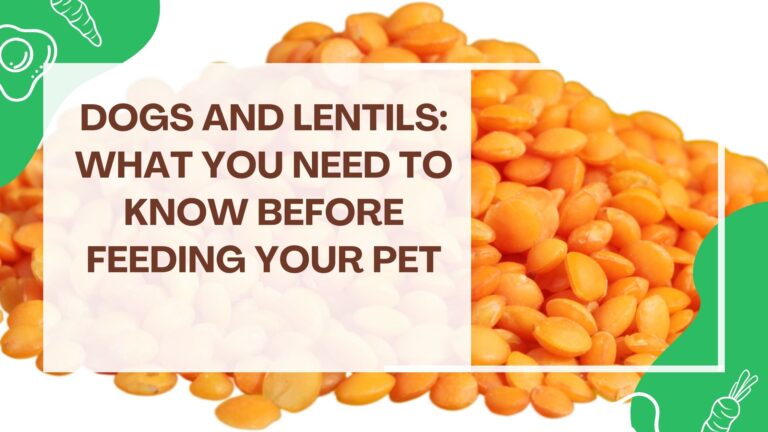Is Your Citronella Plant Toxic to Dogs? How to Keep Fido Safe

Are you wondering if your citronella plant is toxic to dogs? You’re not alone. Often overlooked as a potential safety hazard, citronella plants can be poisonous to our furry friends. Unfortunately, many of us don’t know this until it’s too late and Fido has already gotten into it!
My goal in writing this article is to help pet owners protect their four-legged family members from any potential harm. I’ve been researching houseplants for years now and have gained enough knowledge on the subject that I’d like to share with you. We’ll discuss everything from what makes these plants dangerous, how to recognize them, and how best to keep your pup safe when having them around the home. By the end of this article, you’ll feel like an expert in determining which plants are alright or potentially dangerous for your pup! Let’s get started!
Why are citronella plants poisonous to dogs?
Citronella plants, with their vibrant green leaves and sweet lemony scent, are a popular choice for many gardens. But did you know that these seemingly harmless plants can pose a threat to our furry friends? It’s true! Citronella contains citronellal, a substance found in its essential oil, which can be toxic to dogs if consumed in large amounts.
When dogs ingest citronella oil, it can cause a range of symptoms that should not be taken lightly. Vomiting and diarrhea may occur as the body tries to rid itself of the harmful substance. Excessive drooling is another telltale sign that something is amiss. In more severe cases, seizures may even occur.
To ensure your dog’s safety around citronella plants or products containing citronellal, there are several precautions you can take. Firstly, keep an eye on your pup when they’re exploring the garden or any areas where these plants might be present. If your dog shows any signs of distress after being near citronella or ingesting it accidentally (such as pawing at their mouth or acting agitated), contact your veterinarian immediately.
In conclusion, while citronella plants add beauty and fragrance to our surroundings, they also harbor potential dangers for our beloved pets. By being aware of this risk and taking necessary precautions, we can keep our furry friends safe from harm.
We have covered an extensive guide on Ashwagandha which includes are juniper berries poisonous to dogs. Further to better understand the herb and its various uses, we have covered topics like is kousa dogwood fruit poisonous to dogs which you might be interested in. Also, check out our recent posts: are puffballs poisonous to dogs
How can you recognize citronella plants?
The distinct fragrance of citronella plants is what sets them apart from other plants. It’s like a fresh burst of lemony goodness that instantly uplifts your mood. Imagine stepping into a garden filled with these plants and being enveloped in their refreshing scent.
Not only are citronella plants visually appealing, but they also have some practical uses. Their strong aroma acts as a natural repellent for mosquitoes, making them an excellent addition to any outdoor space. Just imagine sitting on your porch on a warm summer evening, surrounded by these beautiful green wonders while enjoying the gentle breeze without worrying about pesky mosquito bites.
- They require well-drained soil and plenty of sunlight to thrive.
- In colder climates, it’s best to grow citronella plants in containers so you can easily move them indoors during winter months.
- Regular pruning will help keep the plant compact and encourage new growth.
Citronella plants are not just limited to outdoor use; they can also be grown indoors as long as they receive enough sunlight. Placing one near a sunny window or using artificial grow lights can help provide the necessary light for its growth. So why not bring this little piece of nature inside your home and enjoy its delightful fragrance all year round?
Also Read: https://cleverdogcare.com/is-echinacea-poisonous-to-dogs/
What other houseplants are toxic to dogs?
It’s a common misconception that citronella plants are the only ones we need to be wary of when it comes to our pets’ safety. While it’s true that these plants can be harmful if ingested, there are actually several other houseplants that pose a risk as well.
Lilies, for example, may seem innocent enough with their delicate flowers and sweet fragrance, but they can actually be highly toxic to dogs. Ingesting any part of the plant – from the petals to the leaves – can cause symptoms ranging from vomiting and diarrhea to kidney failure. It’s best to keep lilies out of your home entirely if you have a furry friend roaming around.
Philodendrons are another commonly found houseplant that should be on your radar. These popular foliage plants contain insoluble calcium oxalates, which can cause irritation and swelling in the mouth and throat if chewed or swallowed by dogs. Symptoms may include drooling, difficulty swallowing, and even breathing problems in severe cases.
- Lilies: Highly toxic; ingestion can lead to kidney failure
- Philodendrons: Contain insoluble calcium oxalates; may result in mouth/throat irritation
- Snake Plants/Mother-in-law’s Tongue: Toxic substances present; chewing/swallowing can cause nausea/vomiting
- Pothos Vines: Contains insoluble crystals; ingestion may lead to oral discomfort or gastrointestinal issues
The bottom line is that being aware of potential dangers is crucial when it comes to keeping our pets safe. Take the time to research different types of houseplants before bringing them into your home. And remember: prevention is always better than cure!
Also Read: https://cleverdogcare.com/can-dogs-eat-quenepas/
How can you keep Fido safe around citronella plants?
Keeping your furry friend safe is always a top priority, especially when it comes to potential hazards in and around your home. If you’re a fan of citronella plants for their mosquito-repelling properties but worry about the safety of your dog, fear not! There are steps you can take to ensure your pet stays out of harm’s way.
Firstly, it’s crucial to keep those citronella plants well out of reach from your curious canine. Placing them on high shelves or using hanging baskets can help prevent any accidental nibbling or ingestion. Dogs have a knack for finding trouble, so taking these precautions will give you peace of mind knowing they won’t come into contact with anything harmful.
Additionally, consider using pet-friendly alternatives to traditional citronella oil for mosquito control. Lemon eucalyptus and neem oil are both effective options that are safe for dogs. These natural alternatives provide a similar repelling effect without posing a risk to your four-legged companion.
However, accidents happen even with the best preventive measures in place. If you suspect that your dog has ingested any part of a citronella plant, don’t delay seek veterinary care immediately. Prompt action can make all the difference in preventing any potential adverse reactions or complications.
By implementing these simple yet important steps, you can enjoy the benefits of mosquito-free evenings while ensuring the safety and well-being of your beloved pup at home.
Also Read: https://cleverdogcare.com/can-dogs-eat-quenepas/
What are some safe alternatives to citronella plants?
When it comes to repelling insects, many people turn to citronella. But if you’re worried about its potential toxicity, fear not! There are other natural alternatives that can keep those pesky mosquitoes at bay.
Lavender is one such alternative. Its vibrant purple flowers not only add a touch of elegance to your garden but also act as a powerful insect repellent. The strong aroma emitted by lavender plants confuses and repels mosquitoes, making them think twice before buzzing around your outdoor space. Plus, the calming scent of lavender can have a soothing effect on humans too!
If you’re looking for something with a more savory scent, consider planting rosemary. This versatile herb not only adds flavor to your cooking but also acts as an effective mosquito repellent. Simply crush some rosemary leaves and rub them onto your skin or place sprigs of rosemary around your outdoor seating area for maximum protection against these annoying pests.
- Lavender
- Rosemary
- Marigold
Another flower that deserves a spot in your garden is the marigold. Not only do these bright orange and yellow blooms bring cheeriness to any outdoor setting, but they also naturally repel mosquitoes and other bugs. Marigolds contain pyrethrum, which is often used in commercial insecticides because of its effectiveness in warding off unwanted critters.
In conclusion, if citronella isn’t the right choice for you but you still want natural ways to keep insects away from your backyard oasis or garden retreat, consider planting lavender, rosemary, or marigold – all safe alternatives that will beautify your space while acting as effective bug deterrents!
Also Read: https://cleverdogcare.com/is-potentilla-indica-poisonous-to-dogs/
Can dogs develop allergies to citronella?
Dogs, like humans, can have unique sensitivities to certain scents. While it’s pretty rare for them to develop actual allergies to citronella, they might still be bothered by its strong aroma. Imagine you’re walking in a garden filled with fragrant flowers and suddenly your nose starts twitching uncontrollably – that’s how dogs may feel when exposed to citronella.
So, what does this mean for your furry friend? Well, if you notice any unusual symptoms such as sneezing fits or persistent itching after being near a citronella plant or using products containing its essential oil, it’s time to sit up and take notice. These signs could indicate an adverse reaction or sensitivity that warrants further investigation.
If you suspect your pooch is affected by the smell of citronella, don’t panic just yet. Consult with a veterinarian who can properly assess their condition and provide guidance tailored specifically to their needs. After all, our four-legged companions deserve the best care possible!
Conclusion
When it comes to creating a safe environment for our furry friends, we often overlook the potential dangers that certain houseplants can pose. Take citronella plants, for example. While these fragrant beauties may be great for repelling mosquitoes, they can actually be toxic if ingested by dogs.
So why exactly are citronella plants harmful to our canine companions? Well, it all comes down to the essential oils found in their leaves and stems. These oils contain compounds called phenols and terpenes, which can cause a range of symptoms in dogs if consumed. From gastrointestinal distress and vomiting to lethargy and even seizures, the effects of citronella ingestion can be serious.
To keep your pets safe from any potential harm, it’s important to educate yourself about which plants are safe to have around them. A quick online search or chat with your local veterinarian can provide you with a list of pet-friendly houseplants that will not only add beauty to your home but also peace of mind.
- African violets: These delicate blooms are non-toxic and perfect for adding a touch of color indoors.
- Boston ferns: Not only do these lush ferns thrive in low light conditions, but they’re also safe for pets.
- Bamboo palm: This elegant houseplant is not only visually appealing but also completely non-toxic for both cats and dogs.
By being aware of the potential dangers associated with certain houseplants like citronella plants and making informed choices about what you bring into your home, you can ensure a safer environment for your beloved four-legged friends.
Also Read: https://cleverdogcare.com/can-dogs-eat-de-la-rosa-mazapan/
FAQ
1. Are citronella plants toxic to dogs?
– No, citronella plants are not considered toxic to dogs. However, excessive consumption may cause gastrointestinal discomfort or mild irritation.
2. Can my dog safely be around citronella plants?
– Yes, it is generally safe for your dog to be around citronella plants. Just ensure they do not ingest large amounts of the plant as a precautionary measure.
3. What should I do if my dog eats a large amount of citronella plant leaves or stems?
– If your dog consumes a significant amount of citronella plant foliage, monitor them closely for any signs of stomach upset such as vomiting or diarrhea. Contact your veterinarian if symptoms persist or worsen.
4. Are there any other potential risks associated with exposure to citronella plants for dogs?
– While direct contact with the plant is usually harmless, some dogs may have skin sensitivity and develop mild dermatitis from prolonged exposure to the oils in the leaves. Monitor your pet’s reactions and consult with a vet if needed.
5. Can I use citronella oil-based products on my dog without causing harm?
– It is recommended to avoid using concentrated forms of essential oils like undiluted citronella directly on your dog’s skin without consulting with a veterinarian first. Diluted forms in approved pet-safe products may be used according to instructions but watch out for any allergic reactions that might occur.






